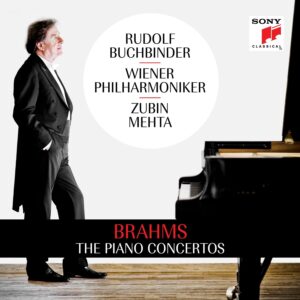Rudolf Buchbinder and Nikolaus Harnoncourt collaborated in a revelatory recording of the Brahms Piano Concertos issued in 2000 that brilliantly demonstrates how to examine familiar scores anew without sublimating one’s musical instincts. Very fine yet relatively conventional interpretations with Buchbinder and Zubin Mehta leading the Israel Philharmonic appeared in 2011 on the Helicon label. In March 2015 Buchbinder, Mehta, and the Vienna Philharmonic joined forces for a series of concerts where both concertos were played on the same program (the B-flat concerto on the first half, the D minor on the second), and soon issued on home video. I haven’t seen the latter, so I can’t be sure if the present audio-only release exactly replicates the video edition’s soundtrack.
That said, the Vienna Philharmonic plays with more fervency, nuance, linear awareness, and passion with Mehta at the helm than they did two years earlier with Andris Nelsons conducting Hélène Grimaud in these works. You immediately perceive Mehta’s seasoned immersion in the Brahms style, and how he organizes the orchestral sonorities from the bottom up while addressing problematic issues of instrumentation.
A case in point concerns a passage in the D minor first movement that I often bring up, in measure 192. Usually the marcato motive that passes between the two horns, the violas, the second violins, and first violins often fades in and out of focus, but not here. The fughetta in the same concerto’s finale boasts more lightness and élan than in any of Mehta’s previous recordings of this music, although the transition into the coda lacks the Israel version’s adroitness and more characterful first-desk bassoon soloist. And while Mehta’s tuttis at the beginning of the B-flat concerto’s second movement don’t lock in so precisely as they do with the Israel Philharmonic, the Vienna musicians compensate with extra gravitas and textural diversity.
As for Buchbinder, his technical resources and stamina are remarkable for a 69-year-old pianist, indeed, for a pianist of any age. The D minor first movement’s descending octave outburst and massive trills and the B-flat first movement opening cadenza’s chordal leaps still radiate power and authority. Buchbinder’s shaping of the B-flat Scherzo’s second theme, dry and to the point under Harnoncourt, conveyed more freedom and legato in the Israel performance, and here too, but less impetuously.
His sensitivity and repose in both concertos’ slow movements is a constant throughout all three versions, with the Vienna Philharmonic’s solo cellist easily standing out in the B-flat (due to closer microphone placement?). However, neither of the live B-flat Rondo codas matches the Harnoncourt version for speed, control, and transparency on both the soloist’s and orchestra’s part. Whereas Harnoncourt’s robustly-hued D minor first movement rarely yields from its grim deliberation, the relatively faster Mehta readings gather steam as they progress. Buchbinder’s slightly flagging energy in the D minor’s final pages is understandable, having just dispensed with the entire Brahms Second and most of the First. No doubt he would have been on fresher form under studio conditions, or less ambitiously arduous live concert circumstances.
In sum, the Vienna Buchbinder/Mehta Brahms concertos often compare favorably to the earlier Israel performances from an interpretive standpoint, and are better engineered, but the Buchbinder/Harnoncourt partnership remains a point of reference for originality and attention to detail.
































